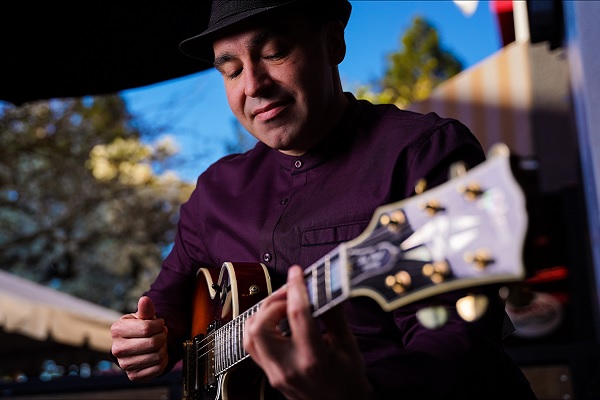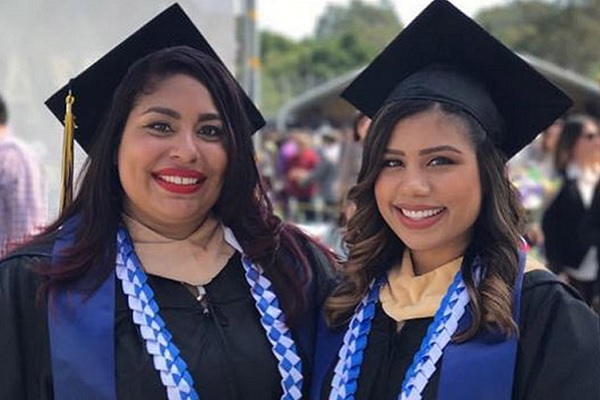News & Announcements

When you listen to Paul Steward’s music, you get more than a unique variety of musical stylings. You also get a glimpse into his childhood. A lecturer of American Indian Studies at SF State, Steward listened to a variety of genres growing up on the Elem Indian Colony reservation: blues, rock, R&B, music of his Pomo tribe and more. In his latest album, “World Champion,” he skillfully blends these sounds. As Native American Heritage Month enters its final days, SF State News spoke to Steward for a closer look at “World Champion,” the inspiration behind it and how he incorporated musical influences from his tribal upbringing.
What was the inspiration for this album?
My inspiration was to show the larger diversity of my musical abilities. The album is my first solo album. I’ve done eight previous albums as the lead singer and guitarist of a musical act called Twice as Good, which is my dad and me.
Twice as Good is famous for being a Native American act but more specifically in the blues genre. I wanted to branch out and be free to jump around into any genre or not be pinned to strictly blues. More of an outreach to pop.
How did you incorporate music from your tribal upbringing?
I’m Pomo Indian, and my heritage greatly influences me as a musical artist. One of the important things for me was to feature a new song that I wrote called ‘Myanik Xe,’ which is ‘beautiful music’ in Southeastern Pomo language.
Our tribe has a lot of different beliefs about our music — what should and should not be shared — because our music is often tied to ceremonial practice. But we have music that we celebrate at public gatherings. ‘Myanik Xe’ was written and composed based on the public music that we could share.
Before I released it, I shared the demo version with some of my tribal community members, relatives and elders to let them hear it and see whether they thought it was appropriate or not. I was very pleased they all said ‘yes.’
Read more of the conversation with Steward on SF State News or listen to his music on his artist website.

President Mahoney and the University Cabinet invite all staff and faculty to an End of Year Celebration recognizing your hard work in 2022.
When: 3 to 5 p.m., Thursday, Dec. 15
Where: Jack Adams Hall in the Cesar Chavez Student Center
RSVP via Qualtrics if you plan on attending.
Those coming to the celebration can bring donations to the University’s holiday toy drive. This year, toys collected will be donated to Oceanview, Merced, Ingleside (OMI) and Lakeview Holiday Toy Giveaway and Celebration, an annual event that brings in the joy of the holidays with food and activities for the entire family and provides youth in our surrounding community with holiday gifts. No gift is too small or too big. However, the Office of the President is requesting that toys donated are new, unwrapped and appropriate for children between the ages of 0 (infant) and 17 years old. Suggested donations: baby toys and supplies, dolls/action figures, stuffed animals, books, sports items, board games and puzzles, arts and crafts supplies, gift cards (for teens), or learning and sensory toys. For questions or concerns regarding the SF State toy drive, please contact icce@sfsu.edu or president@sfsu.edu.

Alumna Christina V. Rodriguez (B.A., ’12) is an influencer with a purpose: make higher education equitable for Latinx students. She’s turned her mission into a trending hashtag on social media — #LatinasWithMasters — which sprouted an online community that’s grown to more than 14,000. Since launching in July 2020, Latinas with Masters expanded from an Instagram handle to podcasts about diversity and inclusion, speaking engagements and consultant work on the same topic, resources for students, online workshops, an entire online community and much more.
The mother of two founded the company after feeling like an outsider in her MBA program at a small private university. She was the only Latina student in her cohort, an experience that was isolating and sometimes painful. It wasn’t that her instructors were prejudiced. In fact, they were great, she says. They just didn’t acknowledge the lack of diversity in the classroom. Instead, the focus of her classes was on business policies and procedures. To not acknowledge race or ethnicity felt like something was missing from the curriculum, she says.
“I am a Latina in business and that does affect the way that I show up to work and the way that I show up for my employees and the way I manage a business, you know,” she said.
The negative feelings from her MBA program may have been magnified because of her undergraduate experience at SF State, she adds. “San Francisco State is very diverse. I graduated in Latino Studies, so my entire curriculum was based on either my experience or Latino culture,” she said. Many of her classmates and faculty looked like her and had similar stories — children of immigrants who were the first in their families to attend college.
Rodriguez later learned the name for what she felt throughout the MBA program: imposter syndrome — that feeling of personal incompetence despite having the right experience and academic training. In 2020, she began a doctorate program in Educational Leadership at Mills College, which led her to reflect on her experience in business school. That’s when she got the idea for Latinas with Masters. She launched the Instagram page with the hope that she’d inspire other women of color to pursue advanced degrees and that she’d provide a community if they’re not finding one in their programs.
When she started her doctorate program at Mills College, Rodriguez thought she’d become a professor. But after launching her company she’s more interested in how it can transform academia and other spaces to be more equitable. Maybe that means eliminating graduate school application fees or the GRE and GMAT as admission requirements — just a few examples of systemic changes she hopes institutions will embrace.
“We have to figure out what a shared vision of equity is,” she said, “so we can do the work together.”
The University Police Department (UPD) is hosting two donation drives aimed at helping those in need this winter.
UPD’s annual toy drive benefits the San Francisco Fire Department Toy Program. Those wishing to pitch in can bring in a new, unwrapped toy from now through Thursday, Dec. 16. Drop-off locations can be found at the UPD office on the Lake Merced Blvd. side of campus on North State Drive and in the lobby of the Children’s Campus, located in campus’ NW Quadrant at the corner of North State Drive and Lake Merced Blvd.
UPD is also collecting coats and other winter apparel to benefit the One Warm Coat organization. Bring in new or gently used winter coats, hats and gloves from now through Thursday, Dec. 16. Donations can be dropped off in the lobby of the UPD office located on the Lake Merced Blvd. side of campus on North State Drive.
SF State Transforms, a campus NSF ADVANCE grant, has released a Fall 2022 Project Newsletter highlighting faculty and the project’s equity-focused efforts to transform campus. This newsletter (the project’s fourth) celebrates the accomplishments of Professor and Chair of Economics Anoshua Chaudhuri, announces this year’s faculty recipients of the ADVANCE Scholarship Hub program and highlights Transforms programs, partnerships and other campus equity efforts. Please see the newsletter on the ADVANCE website or reach out to transforms@sfsu.edu for more information.
The Hospitality and Tourism Management (HTM) department has proposed a name change to the Hospitality, Tourism and Event Management Department.
The reasoning for the proposed name change is that events comprise a major sector of the hospitality industry and a significant number of HTM students are attracted to working in the events business. In addition, HTM students have been very involved in producing events, including the major fundraiser for the department, “The Taste of the Bay”; a major career fair for six NorCal CSU campuses; and the annual department graduation celebration.
Please send any feedback to Professor and Department Chair Colin Johnson at cj7@sfsu.edu or hmp@sfsu.edu.
Join the University Police Department Safety Walk on Tuesday, Nov. 29, as UPD officers walk around campus and meet the community, share safety tips and answer questions. The UPD group will meet in front of the J. Paul Leonard Library at 3 p.m. UPD hopes to see you there.
The School of Music will host “Women/Life/Freedom: A Musical Tribute to the Liberation Movement of Iran” from 1:30 to 3 p.m. Thursday, Dec. 1, in CA 146. This special musical program includes current SF State Iranian students who are all professional performers, composers and teachers, including Sirvan Manhoubi (oud), Mona Shahnava (piano), Shahin Shahbazi (tar) and Samandar Dehghani (tar, daf). The event also will also feature noted alumni guests Nasim Gorgani (daf) and American Indian Studies Chair John-Carlos Perea (cedar flute, vocals, bass). The performance is being coordinated by School of Music Professor Hafez Modirzadeh and co-sponsored by the Center for Iranian Diaspora Studies.
The Archive Project will be joined by original participants in the historic student strike of 1968 for a retrospective event 12:30 p.m. Tuesday, Dec. 6, in the Coppola Theatre. “On Strike! Remembering the Student Strike of 1968” will feature four Bay Area SF State strikers who have been invited to discuss their experiences and perspectives and to appreciate Cinema alum Saul Rouda’s legendary 16 mm film of the events.
Unable to attend in person? Register to view a livestream of the event via Zoom.
This event is sponsored by the Marcus Endowed Chair in Social Justice Film and the School of Cinema and the College of Ethnic Studies Race, Empowerment and Justice Project.
The last Staff Forum of 2022 will be held from 10 to 11 a.m. Wednesday, Dec. 7, via Zoom. Hosted by Human Resources, the forum will feature presentations and updates from the University Police Department and the College of Professional & Global Education (CPaGE). All campus staff (who are not MPP or faculty), both represented and non-represented, are encouraged to attend. RSVP for the Zoom link via Qualtrics.
The All University Committee on International Programs (AUCIP) invites all international and internationally minded faculty and staff to a fun, casual, drop-in coffee hour from noon to 1:30 p.m. Wednesday, Dec. 7, in the Library Teaching and Learning Commons (formerly Faculty Commons), LIB 286. Please drop in for a hot beverage and a chat with your fellow faculty and staff. Refreshments will be provided by the Division of International Education/Office of International Programs.
The University Budget Committee (UBC) will meet from 10 a.m. to noon Thursday, Dec. 15, via Zoom. UBC members also invite you to share input about the Reserves and Carryforwards Policy draft via the Feedback and Questions link on the UBC webpage. UBC meetings are open to the campus community, with a 20-minute public forum for comment. UBC also offers “Office Hours” the next day, Friday, Dec. 16, from 10 to 11 a.m. for staff, and one for faculty/MPPs.
UBC is comprised of your SF State peers: faculty, staff, students and administrators. More information about the UBC can be found on the Administration & Finance website.
These virtual meetings welcome persons with disabilities and may provide reasonable accommodations upon request. To RSVP to the UBC meetings or to ask questions about the UBC or its work, please email ubc@sfsu.edu.
Please join the Soul of SF State and the Associated Students for “The Soul of SF State Presents: A Motown Holiday Music Tribute and Toy Drive” for communities in need. This will be an eventful day of musical tribute, dancing, spoken word performances and more. The event will be held in Jack Adams Hall of the Cesar Chavez Student Center from 2 to 5 p.m. Friday, Dec. 16. RSVP via Eventbrite.
Spotlight
Last week Asian American Studies Professor Russell Jeung visited University of Illinois, Urbana-Champaign to lead a panel discussion and give a presentation at its Asian American Cultural Center. The panel discussion, on Nov. 14, explored the impact of anti-Asian hate on the mental health of families and communities. On Nov. 15, Jeung presented “Be Like Water: Combating Anti-Asian Hate During COVID-19.”
Theatre and Dance Lecturer Arvejon Jones performs a physically grueling role in the annual “The Velveteen Rabbit” show at ODC/Dance in San Francisco. He alternates in the role of the lower half of the 10-foot-tall Nana, requiring another dancer to stand on his shoulders while moving on stage.
“The thing that keeps me doing it is the kids watching this show,” Jones said in the San Francisco Chronicle on Nov. 16. “As a teacher, I think it’s really important to remember who we’re dancing for.”
In honor of Veteran’s Day, History Chair and Associate Professor Laura Lisy-Wagner gave a presentation on “Remembered Light: Glass Fragments from World War II: The McDonald Windows,” an exhibition on display at the War Memorial building in San Francisco. The traveling exhibition is a collection of 25 art pieces using glass shards collected by the late Frederick McDonald from bombed-out European cathedrals, synagogues and chapels during World War II.
Lisy-Wagner gave a talk and slideshow presentation at the San Francisco Public Library Main Branch, followed by a walk-through of the exhibition.
The Boing Boing blog recently featured “The Other Barrio,” a 2015 independent film written by Latina/Latino Studies Professor Emeritus Alejandro Murguía.
The film follows a housing inspector who investigates the “suspicious circumstances of a fatal fire in a residential hotel in San Francisco’s rapidly gentrifying Mission District and finds himself face to face with murder in the streets, corruption at City Hall and his own demons,” the blog post stated.
Murguía’s original short story is published in the anthology “San Francisco Noir” (City Lights Books, 2005).
On Monday, Nov. 21, Associate Professor of American Indian Studies Robert Keith Collins gave a lecture at the Belle Haven Branch of the Menlo Park Library on “Native American Cultural Impact on the U.S." This lecture examined the following question: What impact did Native American cultures have on the United States?
To explore this question, the presentation took a new look at the nature and source of Native American impacts on the language, lifeways and subsistence strategies practiced in the United States. The presentation explored how and why Native American cultural impact must be understood as byproduct of cultural exchanges that occurred between various Native American individuals and populations, Africans and Europeans, and the new economic, fashion and subsistence traditions created in the United States from these interactions. The discussion showed, on the one hand, that contact between Native Americans and Africans and Europeans lent to cultural changes, but on the other, that these cultural changes were experienced by all. Knowing that interactions occurred between Native Americans and Africans and Europeans in the colonial past only skims the surface of the tremendous exchanges of lifeways and subsistence strategies evident in the anthropological and historical records. There remains the challenge of holistically understanding the relevance of these exchanges to the cultural traditions of the United States and the “Gift of Native America.”
Recreation, Parks and Tourism Professor Erik Peper co-authored the article “Teaching Awareness of Shoulder Tension with Somatic Practices and EMG,” which was recently published in the journal Biofeedback. The article describes a useful practice to develop awareness of muscle tension that may contribute to discomfort in the neck and shoulders while working at the computer.
School of Humanities & Liberal Studies Professor Tanya Augsburg is the new associate editor of Issues in Interdisciplinary Studies. Published by Texas Tech University Press, it is an international, peer-reviewed publication dedicated to advancing the theory and practice of the many varieties of interdisciplinarity in the academy and in society at large.